
 Flash News
Flash News
The clash between the BKH agent, the operatives and the people of Agron Kapllanaj, the Police reacts: Some escorted
A house in Kolonjë is engulfed in flames
CNN: Trump may close about 30 foreign embassies and consulates, also affecting the Balkans
Trump imposes more tariffs on computer chips and pharmaceutical products
Serious in Fier, 53-year-old woman found dead in garage
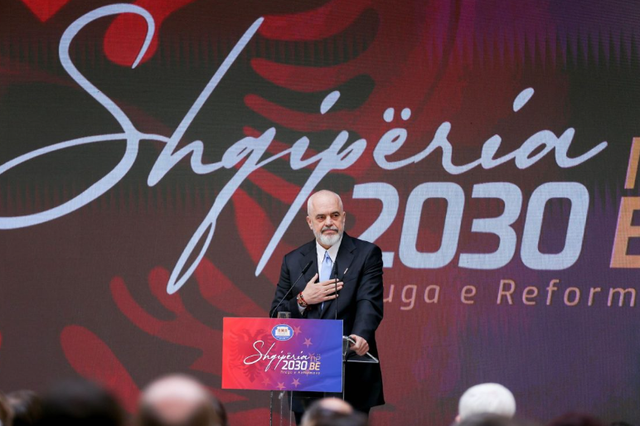
In late March, Prime Minister Edi Rama unveiled a mockup of a future EU passport for Albania and called on voters in next month's elections to give his Socialist Party an unprecedented fourth consecutive mandate to secure the country's accession to the European Union by 2030.
"With an EU passport, Albanian girls and boys will study at any university in Europe, under the same conditions and at the same fees as equal European students," he said.
“With an EU passport, every Albanian will be able to work without a work permit, anywhere from Stockholm to Lisbon.”
Ahead of the May 11 parliamentary elections, Rama's "Albania 2030" program is at the center of his efforts to stay in power for another four years, in addition to the 12 years he has already had.
However, political analysts say the target is too ambitious, citing the lack of progress in the country and the need for EU unanimity for enlargement. Since the start of accession negotiations in mid-2022, Albania has opened only seven of the 35 negotiation chapters it needs to complete.
Afrim Krasniqi, head of the Tirana-based Institute for Political Studies, called Rama's promise "an invention" designed to divert attention from other unfulfilled promises.
“After 12 years in power, the Socialist Party has exhausted its capacity for a reform program and concrete promises,” Krasniqi told BIRN.
“In almost every mandate, it has promised various sectoral reforms and experimental practices that it has been unable to implement. And in these circumstances, the Socialist Party must invent a new promise in its bid for a fourth mandate that removes it from the position of accountability and gives it an advantage in electoral rhetoric.”
“I think the rhetoric of EU integration is just another fabrication,” he said. “It is an attempt to move away from the accountability process and to dominate the political discourse with a fable that is not concrete and does not depend on Albania, is not realistic and is not directly related to the governance of the Socialist Party.”
Concerns about corruption
A candidate for EU membership since 2014, Albania officially began accession negotiations in 2022, along with North Macedonia.
Under Rama, Albania has tried to overhaul its justice system and vetted hundreds of judges and prosecutors to root out corruption. Anti-corruption bodies have managed to bring charges against some of the country's top politicians, but while their efforts have ended decades of impunity for high-level corruption, the EU says more needs to be done.
“The EU takes positive note of several final convictions for corruption charges against senior officials,” the bloc said in October in its “negotiating position” on Albania. “The EU underlines, however, that corruption is pervasive in most areas of public and business life, including all branches of central and local government and institutions, and this remains an area of serious concern.”
“The EU also notes that anti-corruption measures have generally had limited impact so far in the sectors most at risk from corruption.”
Given such criticism, experts say Rama's promise of EU membership by 2030 is an unrealizable dream. Ermal Hasimja, a political expert and professor based in Tirana, stressed that Albania's EU accession does not depend solely on Albania.
“First, integration depends mainly on the EU's willingness to expand, because Albania will not change radically,” Hasimja told BIRN.
“Second, to the extent that it depends on the government’s willingness to implement reforms, integration risks the government playing an obstructive rather than an accelerating role, because criteria such as corruption, the rule of law, or the business environment do not seem to be on the path to resolution.”
Rigels Xhemollari, head of Qëndresa Kyjetare, an NGO focused on good governance, said that Rama's model passport was part of an unfounded "populist narrative."
“He is not selling the European passport as a standard that the country will achieve, but as a visa to get healthcare in Italy and quality education in Germany,” Xhemollari told BIRN. “So he is telling Albanians: ‘I know you will leave, but vote for me so that you leave as equals and not as inferiors.’”
Krasniqi accused Rama of spreading tales.
“Citizens in Albania do not have a culture of accountability and a culture of reflection on unfulfilled promises, so they are willing, to some extent, to believe everything the leader tells them,” he told BIRN.
“Saying 'I guarantee a European passport' is, to some extent, a fairy tale, a fairy tale that sometimes desperate societies like and accept.”/ BIRN
Latest news





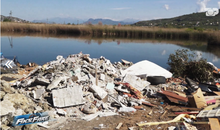


After slapping Gjesti, Jozi "disappears"
2025-04-15 20:45:42
Berisha: Rama will not dare to take the water of the villages of the Vlora River
2025-04-15 20:31:58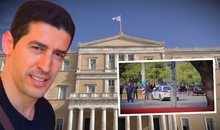


A house in Kolonjë is engulfed in flames
2025-04-15 20:06:00
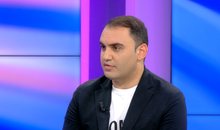
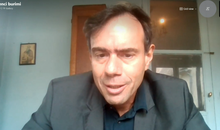

The cry "Rama, go away" interrupts the Prime Minister's speech in Kamëz
2025-04-15 19:20:19

Source: The decision to accelerate negotiations made Rama more aggressive
2025-04-15 19:01:11
Berisha is welcomed with enthusiasm and blue flags in Fier
2025-04-15 18:54:22

Diaspora gets involved in elections, Celibashi announces first vote from abroad
2025-04-15 18:19:58

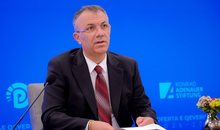
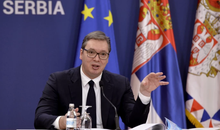

Trump imposes more tariffs on computer chips and pharmaceutical products
2025-04-15 17:09:47
Georgina sparks engagement rumors with Ronaldo/Is the wedding finally coming?
2025-04-15 16:56:04

Researchers warn: Bologna is sinking due to human activity and climate
2025-04-15 16:26:46
Immigrants riot in Gjadra, 3 of them injured with sharp objects
2025-04-15 16:20:43


Is Edi Rama's promise of EU membership in 2030 realistic?
2025-04-15 15:50:19

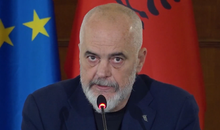
ZDF: Rama's Albania: autocracy, corruption and international trafficking
2025-04-15 15:11:37

University rejects demands/Trump freezes $2 billion in Harvard funds
2025-04-15 14:53:53
Serious in Fier, 53-year-old woman found dead in garage
2025-04-15 14:37:38
Rama: Artificial Intelligence will replace Parliament
2025-04-15 14:28:40
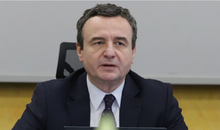





"Toyota" file, SPAK seeks 4 years in prison for Aurel Zarka
2025-04-15 13:11:28
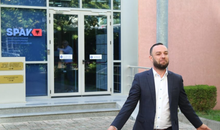
SPAK postpones investigations into Jurgis Çyrbjan
2025-04-15 12:54:04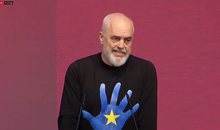
The three moments that dismantle Rama's campaign for the 'European passport'
2025-04-15 12:41:15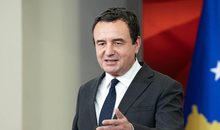

"Golden Bullet"/ Nuredin Dumani reveals details about the murder of Ervis Deda
2025-04-15 12:18:37




Two vehicles collide on the Elbasan-Tirana axis, one injured
2025-04-15 11:20:32


Bylykbashi: Durrës spoke clearly - it is ready for Greater Albania
2025-04-15 10:41:21
Accused of leading a criminal group, SPAK sends Mark Gilaj for trial
2025-04-15 10:32:58
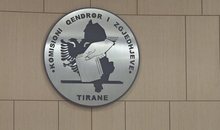



Italian 'hunger' for Albanian forests/ From abusive tenders to worrying reports
2025-04-15 09:51:16
La Sapienza University names a new student space after Ilaria Sula!
2025-04-15 09:38:00
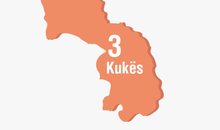
The Battle for Kukës, will there be a reversal this time?
2025-04-15 09:19:11

Healthcare, a luxury for Albanians, 24% cannot afford even basic treatment
2025-04-15 08:54:26
Foreign exchange/ How much foreign currencies are bought and sold today
2025-04-15 08:43:09
Monika Kryemadhi disinfects the chair where Basha was sitting on the show
2025-04-15 08:30:40

Weather forecast for today
2025-04-15 08:09:11
Britain renews financial support for Ukraine
2025-04-15 07:30:47
HOROSCOPE/ Here's what the stars have predicted for each sign
2025-04-15 07:23:18
Morning Post/ In 2 lines: What mattered yesterday in Albania
2025-04-15 07:01:46
LaCivita: What would I say to Edi Rama if I were to confront him?
2025-04-14 23:01:59
"Non grata" for Berisha, Chris LaCivita: Biden administration's mistake
2025-04-14 22:54:15


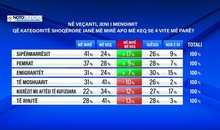
Survey/ 41% of Albanians think that young and old people live worse than in 2021
2025-04-14 22:00:03


BKH conducts new inspections at Erion Veliaj's house
2025-04-14 20:52:33


Serious accident in Shkodra, 16-year-old dies, another minor injured
2025-04-14 20:14:28

Tirana-Durres Railway, from Enver Hoxha to Edi Rama
2025-04-14 19:40:10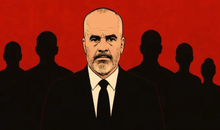

Kremlin accuses Germany of possible 'escalation' of war in Ukraine
2025-04-14 18:53:32





